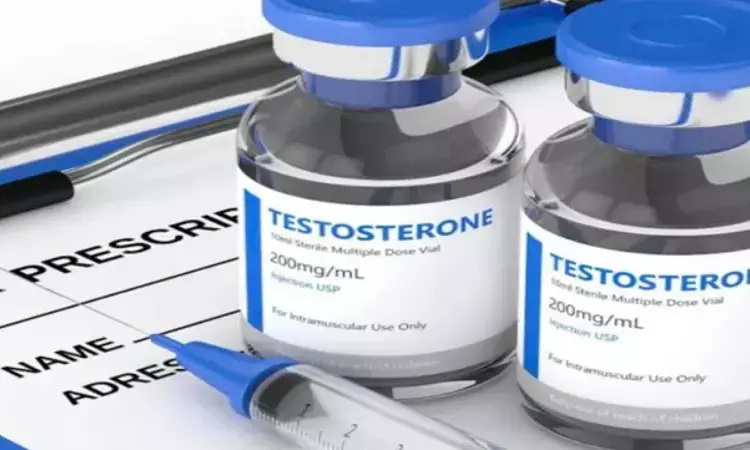- Home
- Medical news & Guidelines
- Anesthesiology
- Cardiology and CTVS
- Critical Care
- Dentistry
- Dermatology
- Diabetes and Endocrinology
- ENT
- Gastroenterology
- Medicine
- Nephrology
- Neurology
- Obstretics-Gynaecology
- Oncology
- Ophthalmology
- Orthopaedics
- Pediatrics-Neonatology
- Psychiatry
- Pulmonology
- Radiology
- Surgery
- Urology
- Laboratory Medicine
- Diet
- Nursing
- Paramedical
- Physiotherapy
- Health news
- Fact Check
- Bone Health Fact Check
- Brain Health Fact Check
- Cancer Related Fact Check
- Child Care Fact Check
- Dental and oral health fact check
- Diabetes and metabolic health fact check
- Diet and Nutrition Fact Check
- Eye and ENT Care Fact Check
- Fitness fact check
- Gut health fact check
- Heart health fact check
- Kidney health fact check
- Medical education fact check
- Men's health fact check
- Respiratory fact check
- Skin and hair care fact check
- Vaccine and Immunization fact check
- Women's health fact check
- AYUSH
- State News
- Andaman and Nicobar Islands
- Andhra Pradesh
- Arunachal Pradesh
- Assam
- Bihar
- Chandigarh
- Chattisgarh
- Dadra and Nagar Haveli
- Daman and Diu
- Delhi
- Goa
- Gujarat
- Haryana
- Himachal Pradesh
- Jammu & Kashmir
- Jharkhand
- Karnataka
- Kerala
- Ladakh
- Lakshadweep
- Madhya Pradesh
- Maharashtra
- Manipur
- Meghalaya
- Mizoram
- Nagaland
- Odisha
- Puducherry
- Punjab
- Rajasthan
- Sikkim
- Tamil Nadu
- Telangana
- Tripura
- Uttar Pradesh
- Uttrakhand
- West Bengal
- Medical Education
- Industry
Polycythemia during testosterone therapy linked to CV events, VTE in men: Study

USA: Development of polycythemia in men on testosterone therapy (TT) increased the risk of major adverse cardiovascular events (MACE) and venous thromboembolism (VTE) in the first year of therapy, states an article published in the Journal of Urology.
An unsafe hematocrit threshold for men receiving TT has never been tested. The association between testosterone therapy (TT) and major adverse cardiovascular events (MACE) or venous thromboembolic events (VTE) is a puzzle. Understanding the risk of these adverse events is paramount to safe prescribing and counseling. Jesse Ory, University of Miami, USA, and colleagues investigated whether the development of secondary polycythemia vera during testosterone therapy (TT) is associated with an increased risk of MACEs and VTEs
Testosterone replacement therapy (TT) is ideal for men with testosterone levels below 300 ng/dL or having symptoms of low testosterone. Undergoing TT can help to restore normal testosterone levels and improve libido, cognition, mood, bone density, muscle mass, and red blood cell production in men. Secondary polycythemia is one of the most common adverse events associated with TT and has been shown to cause thrombosis in men with idiopathic erythrocytosis. Multiple professional organizations have established guidelines on safe prescribing of TT and include an upper safe limit for hematocrit(48% to 55%) during therapy.
Investigators used a multi-institutional database of 74 million patients and identified 2 cohorts of men with low testosterone who received TT and subsequently either developed polycythemia (5,887) or did not (4,2784). Polycythemia was defined as hematocrit ≥52%. As a secondary objective, investigators identified 2 cohorts of hypogonadal men without polycythemia, who either did (26,880) or did not (27,430) receive TT. The primary outcome was the incidence of MACE and VTE in the first year after starting TT.
Key findings of the study,
• Men with polycythemia had a higher risk of MACE/VTE than men who had normal hematocrit while on TT (p <0.001).
• Among men with hypogonadism, those who received TT had similar rates of MACEs/VTEs compared with those who did not receive TT.
Based on the study findings, the authors conclude that in men on TT, developing polycythemia is an independent risk factor for MACE and VTE in the first year of therapy. Men using TT should be aware that they are at a higher risk for MACE/VTE if their hematocrit reaches or exceeds 52% during the first year of therapy, especially men with cardiovascular comorbidities.
In future studies, hematocrit should be included as an independent variable while assessing the safety of TT and hematocrit-based cutoffs should be incorporated into the outcomes of future RCTs investigating MACE/VTE and TT, the authors wrote.
Reference:
Ory J, Nackeeran S, Balaji NC, Hare JM, Ramasamy AR. Secondary Polycythemia in Men Receiving Testosterone Therapy Increases Risk of Major Adverse Cardiovascular Events and Venous Thromboembolism in the First Year of Therapy. J Urol. 2022 Jun;207(6):1295-1301. doi: 10.1097/JU.0000000000002437. Epub 2022 Jan 20. PMID: 35050717.
BDS
Dr. Hiral patel (BDS) has completed BDS from Gujarat University, Baroda. She has worked in private dental steup for 8years and is currently a consulting general dentist in mumbai. She has recently completed her advanced PG diploma in clinical research and pharmacovigilance. She is passionate about writing and loves to read, analyses and write informative medical content for readers. She can be contacted at editorial@medicaldialogues.in.
Dr Kamal Kant Kohli-MBBS, DTCD- a chest specialist with more than 30 years of practice and a flair for writing clinical articles, Dr Kamal Kant Kohli joined Medical Dialogues as a Chief Editor of Medical News. Besides writing articles, as an editor, he proofreads and verifies all the medical content published on Medical Dialogues including those coming from journals, studies,medical conferences,guidelines etc. Email: drkohli@medicaldialogues.in. Contact no. 011-43720751


